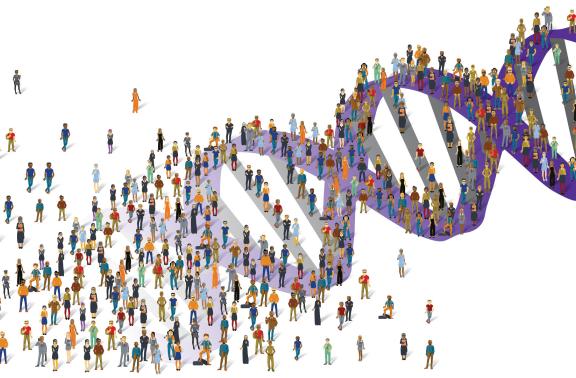
ELSIhub Collections | Race, Genetics, and Genetics Education
Click here for all ELSIhub Collections
Collection Editors
Brian M. Donovan, PhD, Research Scientist, BSCS Science Learning
Daphne O. Martschenko, PhD, Postdoctoral Research Fellow, Stanford Center for Biomedical Ethics
Introduction
The completion of the Human Genome Project in 2003 opened up the floodgates of genetic data, ushering in rapid technological and scientific change. Today, the decreasing costs of genome sequencing are changing our understandings of human identity, especially racial identity. Yet, the influence of genetic science on conceptions of racial identity is not new. For over 100 years, genetic concepts have been deeply entwined with myths about inherent racial inferiority. Today, the science of genetics continues to be used in arguments to maintain or mitigate against structures that perpetuate racial oppression. Such arguments are based in the beliefs that people hold about the relationship between race and genetics. The content of those beliefs are influenced by many factors, such as the ‘geneticization’ of race within the academy, the growing popularity of direct-to-consumer genetic testing, and the prevalence of determinstic ideas about genes in American culture. Genetics education may also play a role in American racial thinking.
A growing body of research indicates that formal and informal genetics education can influence how people conceptualize the relationship between race and genetics, for better or worse. This collection is a compilation of publications that explores what we know about: (1) the complex relationship between genetic beliefs, racial beliefs, and prejudice; and (2) how formal and informal genetics education influences genetic beliefs about race. The reading list draws upon scholarship from social psychology, sociology, science communications, and genetics education. The readings in the first section are intended to help readers construct an understanding of how individuals conceptualize race as a genetic category and the consequences of such conceptualizations. The readings in the second section will help readers, especially educators, understand how to teach genetics in order to increase genomics literacy and decrease racial prejudice. In summary, while the use of genetic concepts to validate prejudiced ideas about race persists today, there are effective educational approaches to counteracting prejudiced beliefs whose adoption should be broadly considered.
Racial essentialism: Origins and consequences
Public belief in racial essentialism
Morning, A. (2009). Toward a sociology of racial conceptualization for the 21st century. Social Forces, 87(3), 1167-1192.
Dar-Nimrod, I., & Heine, S. J. (2011). Genetic essentialism: On the deceptive determinism of DNA. Psychological Bulletin, 137(5), 800-818.
Lynch, K. E., Morandini, J. S., Dar-Nimrod, I., & Griffiths, P. E. (2019). Causal reasoning about human behavior genetics: Synthesis and future directions. Behavior Genetics, 49(2), 221-234.
Panofsky, A., & Donovan, J. (2019). Genetic ancestry testing among white nationalists: From identity repair to citizen science. Social Studies of Science, 49(5), 653-681.
Condit, C. M. (2019). Laypeople are strategic essentialists, not genetic essentialists. Hastings Center Report, 49(S1), S27–S37.
Roth, W. D., & Ivemark, B. (2018). Genetic options: The Impact of genetic ancestry testing on consumers’ racial and ethnic identities. American Journal of Sociology, 124(1), 150-184.
“Extra-curricular” influences on the development of racial essentialism
Phelan, J. C., Link, B. G., & Feldman, N. M. (2013). The genomic revolution and beliefs about essential racial differences: A backdoor to eugenics? American Sociological Review, 78(2), 167-191.
Phelan, J. C., Link, B. G., Zelner, S., & Yang, L. H. (2014). Direct-to-consumer racial admixture tests and beliefs about essential racial differences. Social Psychology Quarterly, 77(3), 296-318.
Roth, W. D., Yaylacı, Ş., Jaffe, K., & Richardson, L. (2020). Do genetic ancestry tests increase racial essentialism? Findings from a randomized controlled trial. PLOS ONE, 15(1).
Morin-Chassé, A. (2014). Public (mis)understanding of news about behavioral genetics research: A survey experiment. BioScience, 64(12), 1170-1177.
Racial essentialism as a contributor to prejudiced beliefs and behaviors
Williams, M. J., & Eberhardt, J. L. (2008). Biological conceptions of race and the motivation to cross racial boundaries. Journal of Personality and Social Psychology, 94(6), 1033-1047.
Andreychik, M. R., & Gill, M. J. (2014). Do natural kind beliefs about social groups contribute to prejudice? Distinguishing bio-somatic essentialism from bio-behavioral essentialism, and both of these from entitativity. Group Processes & Intergroup Relations, 18(4), 454-474.
Soylu Yalcinkaya, N., Estrada-Villalta, S., & Adams, G. (2017). The (biological or cultural) essence of essentialism: Implications for policy support among dominant and subordinated groups. Frontiers in Psychology, 8, 1-10.
Morin-Chassé, A., Suhay, E., & Jayaratne, T. E. (2017). Discord over DNA: Ideological responses to scientific communication about genes and race. The Journal of Race, Ethnicity, and Politics, 2(2), 1-40.
Kimel, S. Y., Huesmann, R., Kunst, J. R., & Halperin, E. (2016). Living in a genetic world: How learning about interethnic genetic similarities and differences affects peace and conflict. Personality and Social Psychology Bulletin, 42(5), 688-700.
Jayaratne, T. E., Ybarra, O., Sheldon, J. P., Brown, T. N., Feldbaum, M., Pfeffer, C. A., & Petty, E. M. (2006). White Americans’ genetic lay theories of race differences and sexual orientation: Their relationship with prejudice toward Blacks, and gay men and lesbians. Group Processes & Intergroup Relations, 9(1), 77-94.
Byrd, W. C., & Ray, V. E. (2015). Ultimate attribution in the genetic era: White support for genetic explanations of racial difference and policies. The Annals of the American Academy of Political and Social Science, 661(1), 212-235.
Formal education as a positive and negative influence on racial essentialism
Textbook-based science instruction as an influence on the development of racial essentialism
Morning, A. (2008). Reconstructing race in science and society: Biology textbooks, 1952-2002. American Journal of Sociology, 114(S1), S106-S137.
Donovan, B. M. (2015). Reclaiming race as a topic of the U.S. biology textbook curriculum. Science Education, 99(6), 1092-1117.
Willinsky, J. (2020). The confounding of race in high school biology textbooks, 2014–2019. Science & Education, 29(6), 1459-1476.
Donovan, B. M. (2014). Playing with fire? The impact of the hidden curriculum in school genetics on essentialist conceptions of race. Journal of Research in Science Teaching, 51(4), 462-496.
Donovan, B. M. (2016). Framing the genetics curriculum for social justice: An experimental exploration of how the biology curriculum influences beliefs about racial difference. Science Education, 100(3), 586-616.
Donovan, B. M. (2017). Learned inequality: Racial labels in the biology curriculum can affect the development of racial prejudice. Journal of Research in Science Teaching, 54(3), 379-411.
Reducing racial essentialism and increasing “humane genomics literacy” with genetics education curricula
Donovan, B. M., Semmens, R., Keck, P., Brimhall, E., Busch, K. C., Weindling, M., Duncan, A., Stuhlsatz, M., Buck Bracey, Z., Bloom, M., & Salazar, B. (2019). Towards a more humane genetics education: Learning about the social and quantitative complexities of human genetic variation research could reduce racial bias in adolescent and adult populations. Science Education, 103(3), 1-32.
Donovan, B. M., Weindling, M., Salazar, B., Duncan, A., Stuhlsatz, M., & Keck, P. (2020). Genomics literacy matters: Supporting the development of genomics literacy through genetics education could reduce the prevalence of genetic essentialism. Journal of Research in Science Teaching. Advance online publication.
Donovan, B. M., Weindling, M., & Lee, D. M. (2020). From basic to humane genomics literacy: How different types of genetics curricula could influence anti-essentialist understandings of race. Science & Education, 29(6), 1479-1511.
Tawa, J. (2020). Does social constructionist curricula both decrease essentialist and increase nominalist beliefs about race? Science & Education, 29(6), 1513-1540.
Hubbard, A. R. (2017). Teaching race (bioculturally) matters: A visual approach for college biology courses. The American Biology Teacher, 79(7), 516-524.
Beckwith, J., Bergman, K., Carson, M., Doerr, T., Geller, L., Pierce, R., Krimsky, S., Martin, C., Santiago, M., Murray, A. V., Warren, C., & Zichterman, C. (2017). Using dialogues to explore genetics, ancestry, and race. The American Biology Teacher, 79(7), 525-537.


